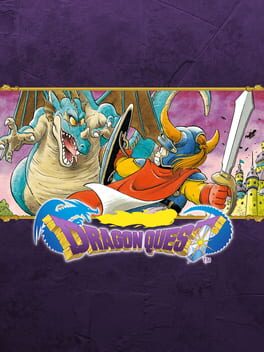The template laid down by Dragon Quest remains undefeated in the genre of Japanese RPGs. There is a remarkable level of care that has gone into making sure that there is an appropriate level of friction between the adventure of the player and the objective of the game.
The game is fairly small and "spherical". By that I mean that there is a centerpoint that is Radatome Castle, and then there is the rest of the map that is equally long in both directions, east and west. This allows the game to justify (a poor word to choose considering they had legitimate technical limitations, but it gets the point across) making saving exclusive in Radatome Castle, at King Lars's. No distance then is great enough to be too tedious to traverse. Planning your travels is easy as well, considering you can purchase Wings of the Chimera early in the game to teleport back to Radatome Castle, and later on you can access the Return spell to use in place of the Wings. It also bears reminding that death doesn't bring any particular penalty other than interrupting your exploration and bringing you back to the centerpoint, which is farily forgiving given what was said for distances. The game is also crystal clear. The combination of the game box manual along with the initial indications from King Lars give all the tools you need to understand and clear the game. People in towns rarely gives you cryptic messages.
Ultimately, the game is lenient and fair with its player. And this lenient structure allows the game maker to be more thoughtful of the points where is wants to increase friction, rather than just make the game all friction. There are of course parts of the experience that suffer because of this. Battles become a matter of simple attacking arithmetic with no further complexity involved whatsoever, besides the Sleep spell that can come in handy in certain parts of the game where the dps race does not particularly work in the player's favour. This already highlights how random battles have been a particular point of strain in the genre since the beginning, which few have ever really dealt with correctly. Moreover the inherent small size of the world makes for a short experience, alothough for sure not unpleasant (I think it is fair to remember I have played the SNES remake which has some quality of life improvements that might have shaved off almost an hour of game time). And in particular the endgame feels a little anti-climactic, mostly because of its lack of active narrative and letting the player decide for themself the moment of ending the game.
In the end, this game embodies a level of playfulness that is perfectly encapsulated by Akira Toriyama's artistic design for the series at this particular moment in the author's artistic development. Simple, rotund, clear, uncomplicated.
The game is fairly small and "spherical". By that I mean that there is a centerpoint that is Radatome Castle, and then there is the rest of the map that is equally long in both directions, east and west. This allows the game to justify (a poor word to choose considering they had legitimate technical limitations, but it gets the point across) making saving exclusive in Radatome Castle, at King Lars's. No distance then is great enough to be too tedious to traverse. Planning your travels is easy as well, considering you can purchase Wings of the Chimera early in the game to teleport back to Radatome Castle, and later on you can access the Return spell to use in place of the Wings. It also bears reminding that death doesn't bring any particular penalty other than interrupting your exploration and bringing you back to the centerpoint, which is farily forgiving given what was said for distances. The game is also crystal clear. The combination of the game box manual along with the initial indications from King Lars give all the tools you need to understand and clear the game. People in towns rarely gives you cryptic messages.
Ultimately, the game is lenient and fair with its player. And this lenient structure allows the game maker to be more thoughtful of the points where is wants to increase friction, rather than just make the game all friction. There are of course parts of the experience that suffer because of this. Battles become a matter of simple attacking arithmetic with no further complexity involved whatsoever, besides the Sleep spell that can come in handy in certain parts of the game where the dps race does not particularly work in the player's favour. This already highlights how random battles have been a particular point of strain in the genre since the beginning, which few have ever really dealt with correctly. Moreover the inherent small size of the world makes for a short experience, alothough for sure not unpleasant (I think it is fair to remember I have played the SNES remake which has some quality of life improvements that might have shaved off almost an hour of game time). And in particular the endgame feels a little anti-climactic, mostly because of its lack of active narrative and letting the player decide for themself the moment of ending the game.
In the end, this game embodies a level of playfulness that is perfectly encapsulated by Akira Toriyama's artistic design for the series at this particular moment in the author's artistic development. Simple, rotund, clear, uncomplicated.
